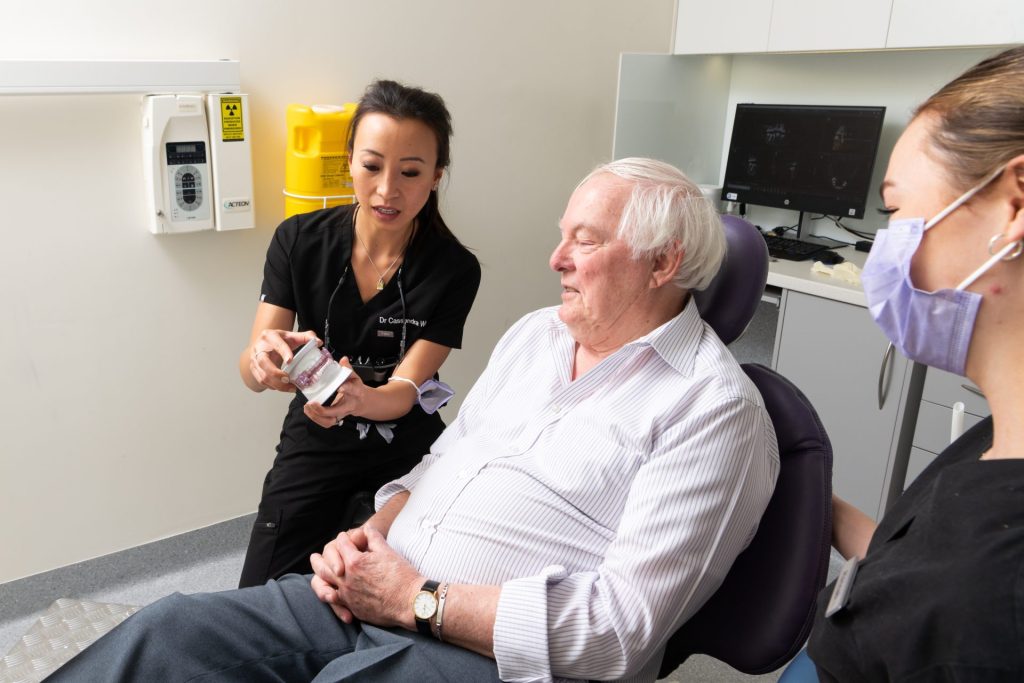
The highest quality dental crowns and exceptional patient care
A dental crown is a versatile restorative and cosmetic dental prosthetic that our dentists use to give a tooth a new breath of life, restoring its strength and enhancing its appearance. A crown essentially provides a protective cover for a broken or weakened tooth, creating a perfectly natural looking end-result that blends perfectly with surrounding natural teeth.
At The Village Dentist, you can rest assured knowing that your dental crown is made in an Australian laboratory of the highest quality material approved by the Therapeutic Goods Administration. Besides that, our dental team is extra caring and gentle, making the process of getting a crown so simple it’s almost relaxing!
Do I need a dental crown?
There can be many appropriate use cases for a dental crown, both cosmetic and restorative. However, knowing if you need one is only something you can establish in a dental appointment after a thorough oral examination. Below, you can explore a few cases in which our dentists may recommend a dental crown:
- a severely cracked, chipped or otherwise damaged tooth
- advanced tooth decay
- an excessively weakened or worn down tooth
- a discoloured or misshapen tooth
- teeth with slight misalignment
- to cover a tooth after root canal therapy
- to attach a dental bridge to
What are dental crowns made of?
At our Castle Hill dental practice, we offer a range of dental crown materials to suit different needs and budgets. Each material has unique characteristics, which our experienced dentists can explain to you in detail during a consultation. Below, you can explore some of the dental crown materials available at The Village Dentist.
- Gold or silver: Crowns made from gold or silver, or sometimes a combination of the two, offer robust durability and long-lastingness. They’re often recommended for molars because of their ability to withstand the elements (chewing, grinding, etc).
- Porcelain and metal: Crowns made from these two materials involve a porcelain crown which we then fuse to metal. This offers a combination of natural-looking aesthetics and durability.
- Porcelain: Crowns entirely made from porcelain are a popular option for many reasons. With the new technology in porcelain, they are proving to be as strong as metal crowns but also provide a natural appearance and biocompatibility.
- Resin: These crowns are made of composite resin. They can be colour-matched to your natural teeth, but don’t offer the same durability as porcelain or metal crowns..
What to expect when getting a dental crown
The exact process may differ slightly from patient to patient, but here’s what you can generally expect when getting a dental crown:
Step one: The first step involves a consultation with one of our friendly dentists at our Castle Hill dental practice, during which you’ll undergo a thorough dental examination to determine if a dental crown is the most suitable treatment option for you. If it is, your dentist will provide you with all the information and costs associated with the process ahead and get you booked in for the next step of getting a dental crown.
Step two: During your next appointment, your dentist will numb the area and then prepare your tooth for its new crown. Once prepared, your dentist will take an impression of your tooth to send to the dental laboratory for the custom design and fabrication of your crown.
Step three: Once your dental crown is ready, you’ll come in for your final appointment. During this appointment, your dentist will make any final adjustments required before bonding your crown into place and finishing it off by giving it a polish for a natural look and feel.
Taking care of a dental crown
Regardless of what your dental crown is made from, there are ways you can take care of it to prolong its service life. Luckily, it doesn’t involve much outside of a standard good at-home dental hygiene regime. Here are a few ways you can take care of your new crown:
- Brush your teeth every day, twice a day, for two minutes each time
- Floss your teeth once a day
- Use fluoride toothpaste
- Eat a well-rounded, healthy diet
- Be careful when eating hard foods
- Protect your teeth from clenching and grinding with a bite splint
- Protect your teeth from contact sports by wearing a customised sports mouthguard
